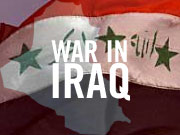Audio
Photos
Your Voice
| ||||||||||||||||||||||||||
War raises questions for Azad Berwari
March 28, 2003
 |
| Azad Berwari is one of about 500 Iragi Kurds living in the Fargo/Moorhead area. (MPR Photo/Bob Reha) |
Moorhead, Minn. — Azad Berwari sits at a computer in an office shared by several North Dakota State University graduate students. The 39-year old is working on a masters degree in sociology.
Berwari left Iraq in 1992. He emigrated to Sweden where he became a naturalized citizen. He has been in the United States since 1997, but he's lived with war for most of his life.
"The day I was born, that day Iraqi airplanes bombed our house," says Berwari. "My family's home was burned by napalm bombs, which is that kind of bomb that burns when it explodes it creates a huge fire." Berwari says growing up as a Kurd he saw first-hand, what he calls 'the miserable results of war.'
"They bombed a school, a primary school in Kurdistan. They killed over 112 kids and over 200 were injured," says Berwari. "And the whole population was terrorized to death. You have pieces of kids of flinging in the air as a result of the bombing."
Berwari says he has recently been in contact with his parents and siblings. They still live in Iraq. For now they are safe. He wants to see Saddam Hussein removed from power. But he has a lot of questions about whether life will improve for the Kurds, even with Saddam's defeat.
"Who's going to have the power over these changes and in what direction are they going to be happening?" says Berwari.
"Who's going to have a role in that change? Who is the dominate power in that change? What are the forces that are going to be part of the change? What is the new structure? All these questions I don't have any answer for that."
Berwari fears Kurdish freedom is a secondary consideration for the U.S He says U.S. policy seems to favor Turkey. Berwari says the Kurds have long asked the administration for help to fight Saddam.
"Nothing of this happened, why I should be so dumb to believe that the administration is there to free my country," says Berwari. "They are there for their own political economic benefits rather than Iraqi people or Kurds."
Berwari wishes more Kurdish people in the Fargo-Moorhead area would speak out on the war. He says Kurds have not adapted well to America. He says many Kurds still fear speaking out, because of the oppression they endured in Iraq. Berwari says his future is focused on getting his masters degree and maybe one day going home.
"Definitely, that's a dream. But a safe home. Not a home, and the invasion of Turks from one side, and the invasion of the new regime from the other side," says Berwari.
Azad Berwari says he'll continue to speak out about the Kurdish people. He hopes it will bring attention to their problems and issues, so that when the fighting is over, they will not be forgotten.
|
News Headlines
|
Related Subjects
|

